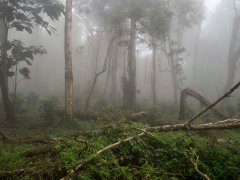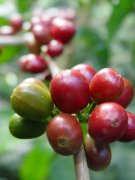Willem Boot and his donkey mule manor plan and the story that Rosa has to tell

For professional baristas, please follow the coffee workshop (Wechat official account cafe_style)
When the result of "Best Panama" was announced in 2014, the mule Manor, which took part in the competition for the first time, won the first prize and 11th place in the Rose Summer category. The annual competition, held by the Panamanian Fine Coffee Association (Specialty Coffee Association of Panama), has been famous for Geisha for a decade, and all the best coffee farms in Panama have come up with the best Rosa batch to win the gold cup in the boutique coffee industry. There were 50 groups in the Rose Summer batch, which came from heavyweight estates such as Jade Manor, Elida, Carmen, Kotowa, St. Teresa, etc., but the first prize was won by La Mula, a small manor that was only 7 or 8 years old, which made the boutique coffee industry all over the world unbelievable!
The Donkey Manor project, created by bean baker Willem Boot, has created an incredible legend from scratch.
Willem Boot was born in the Netherlands, and his family runs a coffee shop Golden Coffee Box in Baarn, which can be said to be a coffee family. After earning a master's degree in economics from the University of Amsterdam (University of Amsterdam), he worked in his father's cafe in 1989. Willem Boot later moved to the United States, first working for Probat, a German bean dryer in San Francisco. In 1999, he founded Boot Coffee Consulting, a coffee consultancy company, to provide consulting services to coffee companies around the world, including Colombia, Panama, El Salvador, Honduras and Yemen. In addition to offering coffee training courses, he taught people how to identify raw beans, cup testing and roasting, as well as coaching local farms on how to improve the quality of raw beans. It can be said that he was an experienced man of origin before he set up his own coffee farm.
In 2004, during the first open cup test in Rose Summer, Boot drank Rose Summer as a judge and was fascinated by the strong flavor and aroma of this variety. Soon after, the opportunity came when Graciano Cruz, a famous Panamanian coffee farmer, told him that there was a piece of land on Mount Baru with steep terrain, lush forests and unique conditions. For Boot, it was a dream come true. He bought the land and renamed it La Mula (he first visited the estate in 2006 by riding a mule! ), planted 6000 rose summer trees, and planted the first sapling himself. A total of three rose summer varieties were later found in the manor: green and brass pointed rose beans (Green/Bronze tip Geisha) and the natural mixture of dwarf rose beans (Dwarf Geisha).
Mule Manor is scheduled to start in 2006. The estate is located in the southern foothills of the Baru volcano in Panama, above the town of Portrerillos, 1700-1800 meters above sea level, nearby is the famous boutique coffee producing area of Boquete Valley, the estate itself is very small, only 5 hectares, can be said to be a miniature manor. The hillside used to be covered with primeval forests, and tall trees provide the best environment for shade-grown coffee. in some places, even because the trees are too luxuriant to penetrate through the sun, affecting the growth of coffee, we had to clear the dense bushes a few years ago. let the rose summer trees grow fully. Overlooking from the mule estate, you can also see the Atlantic Ocean. In addition to potassium and phosphorus, the content of organic matter in the volcanic soil of the manor is also very high.
Boot brought in Kelly Hartmann, the youngest son of the Hartman family, who has been growing coffee for generations, to manage the farm and to ask agronomists who are well versed in coffee to help improve the planting profession. The actual farm tasks are carried out by 15 Ng ö be-Bugl é indigenous farmers from the "Escuela de Caf é" set up by the famous Panamanian coffee farmer Graciano Cruz, and Graciano personally teaches coffee farming skills, as part of the course, to work on a "mule farm".
Since the 19th century, the indigenous people of Ng ö be-Bugl é have been an indispensable labor force on alpine farms in Panama. There are two regular resident employees, and Willem Boot has built a pretty good staff dormitory for them in the manor, which is said to be a rare benefit of the nearby farm. The manor has five kinds of coffee and five kinds of beans and vegetables as a source of food for the staff.
After the coffee cherry is harvested, it will be sent to the processing plant of Hartman Manor for post-processing and the sun will last for 14 days. During the sun exposure, a canopy is used to heat slowly, while Hartman Manor is stored at rest after drying. According to Boot's own experience, the mule estate faces the Atlantic Ocean and is different from other estates facing the Pacific Ocean, while her rose summer density is quite high and baking is challenging.
Rose summer comes from Ethiopia, is a very old bean species, through the introduction of Panama Tang Patch Manor, Emerald Manor will carry forward, rose summer has become a noble variety snapped up by all parties, leaving the Blue Mountains and far behind. Become the first choice of boutique coffee.
Willem Boot was fascinated after his first encounter with Rosa in Panama. in order to unravel the mystery of the origin of Rosa bean, he organized an Ethiopian expedition in 2004 to go deep into the primeval forests of Ethiopia in search of primeval rose.That expedition failed. But Willem Boot's obsession with Rosa has never stopped. In addition to buying land to grow Rosa in La Mula, in 2013, he worked with Dr. Sarada Krishnan of the Denver Botanical Garden to continue to promote the root search of Rosa in Ethiopia.
Mule Manor is a farm project led by a bean baker, on behalf of a coffee man who loves rosy summer.
Important Notice :
前街咖啡 FrontStreet Coffee has moved to new addredd:
FrontStreet Coffee Address: 315,Donghua East Road,GuangZhou
Tel:020 38364473
- Prev

The Story of Rose Summer returning Home Rose Summer Coffee beans at the Manor of Rose Summer Village in Ethiopia in Adam Overton
Professional baristas Please follow the Coffee Workshop (official Wechat account cafe_style) before Adam Overton met Willem Boot, Adam Overton had only a vague dream to buy a farm in Ethiopia and grow the world's most delicious coffee rose (Geisha). Why Ethiopia? Because it is said that Ethiopia is the original place of Rose Summer.
- Next

Columbia Rose Summer Geisha Coffee Columbia Hope Rose Summer-Hope Manor boutique coffee beans
For the exchange of professional baristas, please pay attention to the coffee workshop (Wechat official account cafe_style) Geisha pronunciation is the same as Japanese geisha, so some are also called geisha coffee; because the tree species are taller than ordinary coffee trees, they were originally planted in a small area of the manor and were used as windbreaks. And the son of the manor owner, in order to participate in the annual competition for the best coffee in Panama,
Related
- Detailed explanation of Jadeite planting Land in Panamanian Jadeite Manor introduction to the grading system of Jadeite competitive bidding, Red bid, Green bid and Rose Summer
- Story of Coffee planting in Brenka region of Costa Rica Stonehenge Manor anaerobic heavy honey treatment of flavor mouth
- What's on the barrel of Blue Mountain Coffee beans?
- Can American coffee also pull flowers? How to use hot American style to pull out a good-looking pattern?
- Can you make a cold extract with coffee beans? What is the right proportion for cold-extracted coffee formula?
- Indonesian PWN Gold Mandrine Coffee Origin Features Flavor How to Chong? Mandolin coffee is American.
- A brief introduction to the flavor characteristics of Brazilian yellow bourbon coffee beans
- What is the effect of different water quality on the flavor of cold-extracted coffee? What kind of water is best for brewing coffee?
- Why do you think of Rose Summer whenever you mention Panamanian coffee?
- Introduction to the characteristics of authentic blue mountain coffee bean producing areas? What is the CIB Coffee Authority in Jamaica?

